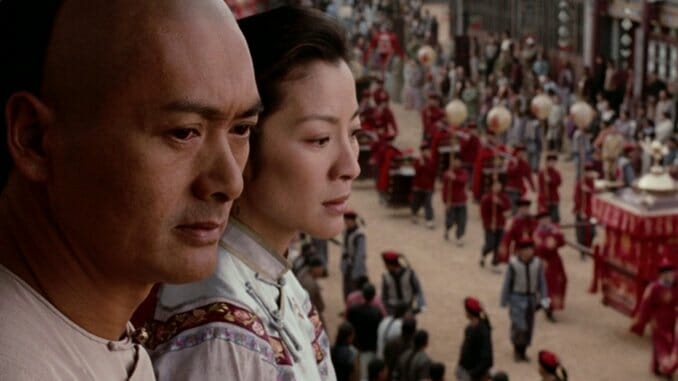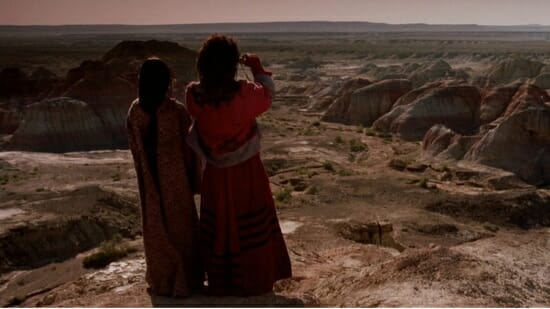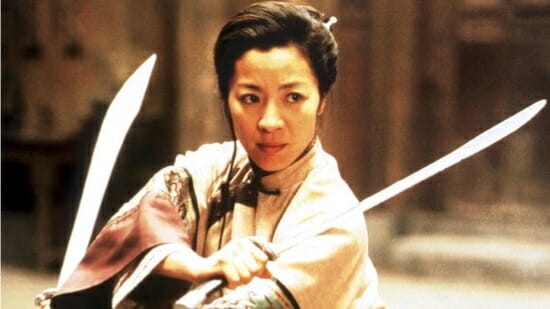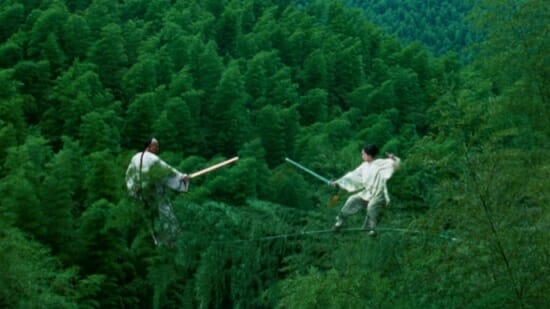Crouching Tiger, Hidden Dragon Briefly Brought Wuxia to America
At 20, the operatic martial arts epic might still be the eclectic director’s greatest success.
Movies Features Ang Lee
Ang Lee’s filmography is among the most varied and ambitious of any director currently working in Hollywood, and it’s difficult to make any kind of sweeping statement about his body of work as a whole. Consider, though, that his critical successes tend to be intimate stories (Brokeback Mountain, The Ice Storm) while his notable flops have been FX-heavy spectacles (last year’s disastrous Gemini Man, 2003’s Hulk). It’s for that reason that the Taiwanese-American director’s Crouching Tiger, Hidden Dragon seems like some sort of miracle: A lavish kung fu period piece, set in a period about which most American moviegoers are totally ignorant, subtitled, entirely starring an Asian cast that somehow nabbed a Best Picture nomination.
Twenty years on, it feels as if the ripples it cast in Hollywood have largely subsided—I couldn’t find a single screening of Zhang Yimou’s Shadow within a hundred miles of me when it arrived in American theaters last year. In 2000 and for a couple of years after, though, it seemed as if martial arts movies were carving a new niche into American theaters, with the precision of a taijijian thrust.

Crouching Tiger, Hidden Dragon’s odd story structure and occasionally perfunctory plot points stem in part from the fact it is an adaptation of the fourth novel in a five-book series. Wang Du Lu’s series, collectively called the Crane-Iron Pentalogy, were published in the 1930s and follow the exploits of a number of martial arts heroes in China. The wuxia genre is about rough-and-tumble adventurers navigating the martial arts world, discovering new forms of combat techniques with which to destroy their rivals and avenge their slain masters. It’s a pulp genre through and through, as suited to the wandering hero narrative as the Western or the samurai film.
The story of Crouching Tiger, Hidden Dragon follows two pairs of doomed lovers. The wandering heroes Li Mu Bai (Chow Yun-fat) and Yu Shu Lien (Michelle Yeoh) won’t admit their feelings for one another out of a desire to honor the memory of a slain friend. Stifled aristocrat Jiao Long (Ziyi Zhang, in the role that made her career) dreads an impending arranged marriage and yearns to return to the arms of the thief Luo Xiao Hu (Chang Chen). (One thing lost in translation seemingly on purpose is that the subtitle writers decided to change Ziyi and Chang’s character names. “Lóng” is the Mandarin for “dragon” and “h?” for “tiger,” meaning that many people who watched the movie didn’t pick up that this latter pair are actually the title characters.)
Li Mu Bai is trying to get out of the wandering swordsman business, and has left his legendary Green Destiny sword in the care of an old friend. At the same time, Shu Lien hears word of the return of Li Mu Bai’s hated enemy, Jade Fox (Cheng Pei-pei), and suspects that the young thief who makes off with the sword in the middle of the night might actually be the young woman, Jiao Long.
The plot sees the heroes and villains engage in several stunningly choreographed and shot fights, battling to lay hands on the macguffin and trying to kill each other over past slights (usually in vain). The main story pauses out of nowhere for an extended flashback that introduces Chang’s desert thief. Robbed by Xiao Hu as she and her entourage cross the desert, Jiao Long doggedly pursues him, kicks every ass in his bandit company, and falls in love with him (as one does). Ultimately, however, she must return to her family or risk a lifetime of being hunted. Xiao Hu rejoins the narrative in the present but then proceeds to exit just as quickly, hanging out with Li Mu Bai’s monk friends while the plot is resolved.
Though Chow and Yeoh command the most screen presence and unleash the most powerful kung fu, the melodrama really belongs to Ziyi. Enraged that she can’t beat Li Mu Bai, wounded by the friendship with Shu Lien that her own actions have ruined, and ultimately unable to be a respectful pupil to her secret master Jade Fox any longer, Jiao Long steals the sword and strides the martial arts underworld without any fucks left to give. Li Mu Bai and Shu Lien ultimately find her by following the trail of humiliated fighters left in her wake.

Crouching Tiger, Hidden Dragon was a peculiar movie even in the context of a martial arts film, and at times during its production seemed like a disaster in the making. The four romantic leads all have noticeably different accents and among them only Ziyi was a native Mandarin speaker in the Mandarin-language movie. Yeoh—a Malaysian native who learned her Mandarin lines phonetically for the role—said it utterly flummoxed the Beijing-based film crew at times. Chow Yun-fat, a Cantonese speaker, recalled having to do 28 takes on the first day of filming just to get his lines right.
The film features sweeping vistas of the Gobi Desert, one of the hottest and driest places on the planet: It constantly rained during the shooting schedule. The locals, Lee said, credited the bizarrely bounteous rainfall to the production’s practice of burning prayer incense for good fortune prior to shooting. Yeoh injured herself and was laid up for a month with a bum knee. Lee said he didn’t take a single break in eight months of making the thing and thought he was bound to have a stroke
The result was incredible, captivating critics and audiences and bringing a different kind of action to cinemas. The stunts in Crouching Tiger, Hidden Dragon employ digital trickery only to render the actors’ wire harnesses invisible—for the most part you really are seeing Michelle Yeoh and Chow Yun-fat and Ziyi Zhang sailing over rooftops and engaging in Wudang sword duels on the tips of bamboo trees, or leaping between the top and bottom floors of a tea house while smacking around 20 guys. Married to Lee’s career-long understanding of how to trap characters in emotional prisons and draw out the ensuing conflict, it’s a melodrama that plays out as much in flowing kung fu duels as in wounded glances.

I’m tempted to say that if Gladiator hadn’t stepped in to take Best Picture from it that Crouching Tiger just might have won, but that may be wishful thinking. Alone among the nominees for Best Picture that year, Crouching Tiger, Hidden Dragon’s cast were nominated for zero acting awards. I will (and have) argued that Gladiator is too much fun to watch, but Crouching Tiger beats it at almost everything it’s good at: epic period melodrama, spectacular action, lavish costume and art direction.
More than that, it feels like one of the most giddily personal movies Lee has ever made, like he’s diving gleefully into a favorite genre and isn’t at all self conscious about making a movie where scenes of simmering longing between Lovers Whose Love Is Forbidden coexist with kung fu techniques that paralyze opponents or chop sword blades in half.
The years immediately following it saw some earnest attempts at importing more wuxia and Hong Kong action to America, with movies like Hero and Iron Monkey seeing rereleases, Ziyi returning in House of Flying Daggers and Chow in Curse of the Golden Flower. None of them made a big enough splash to gain a long-term foothold, though.
As Li Mu Bai says in one long overdue intimate moment with Shu Lien: There’s nothing we can hold onto in this world. When it comes to what hits wide release in America, that’s apparently doubly true for films that are subtitled.
Kenneth Lowe is the dragon from the desert. You can follow him on Twitter and read more at his blog.